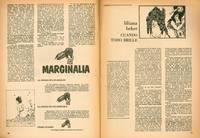El Ornitorrinco. Revista De Literatura. Later Subtitle: Revista Contagiosa. No. 1 (Oct/Nov 1977) Through No. 14 (July/Aug 1986) (all Published) -

El Ornitorrinco. Revista de Literatura. Later subtitle: Revista Contagiosa. No. 1 (Oct/Nov 1977) through No. 14 (July/Aug 1986) (all published)
- Used
A complete run in 14 issues of the Argentinian literary journal, issues approx. 26-30 pp. each, edited by Abelardo Castillo and Liliana Heker, containing prose, poetry, essays, interviews, and criticism, including contributions from Isidoro Blaistein, Cristina Piña, Liliana Heker, Guillermo Boido, Elia Parra, Luis Prieto, Juan Miguel García Fernandez, Joyce Cary, Edna Pozzi, Juan José Manauta, Lewis Carroll, Ernest Hemingway, Flannery O'Connor, Herman Hesse, Rodolfo Grandi, Juan Rulfo, Stig Dagerman, James Purdy, Edith Wharton, and many others. Illustrated throughout, primarily from drawings and cartoons. 4to. Original illustrated saddle-stapled wrpps., some mild dust-staining and soiling. Buenos Aires, 1977-1986. In the first issue of El Ornitorrinco, editor Abelardo Castillo lays out a six-point manifesto of sorts, which he calls "Muerte y Resurreccion de las revistas literarias; o 6 aproximaciones para armar un ornitorrinco." Under the first point, he writes: "Hemos venido a llenar un vacio y desde ahora la crítica, la poesía, la narrativa y el arte en general somos nosotros." In spite of censorship issues, in the fourth issue dated Oct/Nov 1978, Castillo lays out the magazine's position against the war with Chile in the form of an editorial, and in issue no. 9 (Jan/Feb 1981) there appear two lists of the disappeared with any known information requested for their whereabouts. El Ornitorrinco was the only cultural magazine at the time that was encouraged to publish these lists. Scarce institutionally; as of November 2019, WorldCat locates six physical holdings in North American institutions.
-
Bookseller
Bernett Rare Books Inc
(US)
- Book Condition Used
- Quantity Available 1